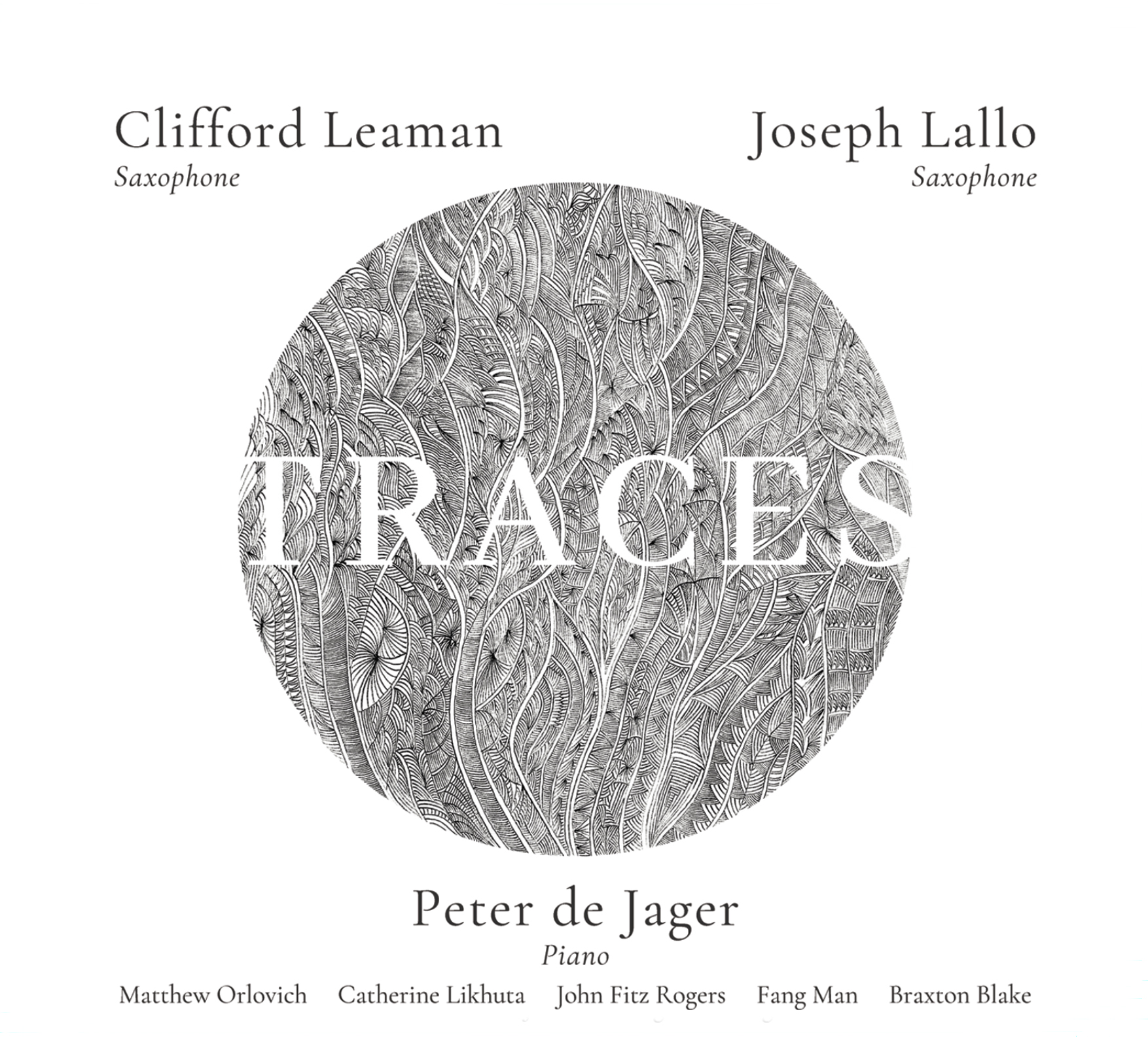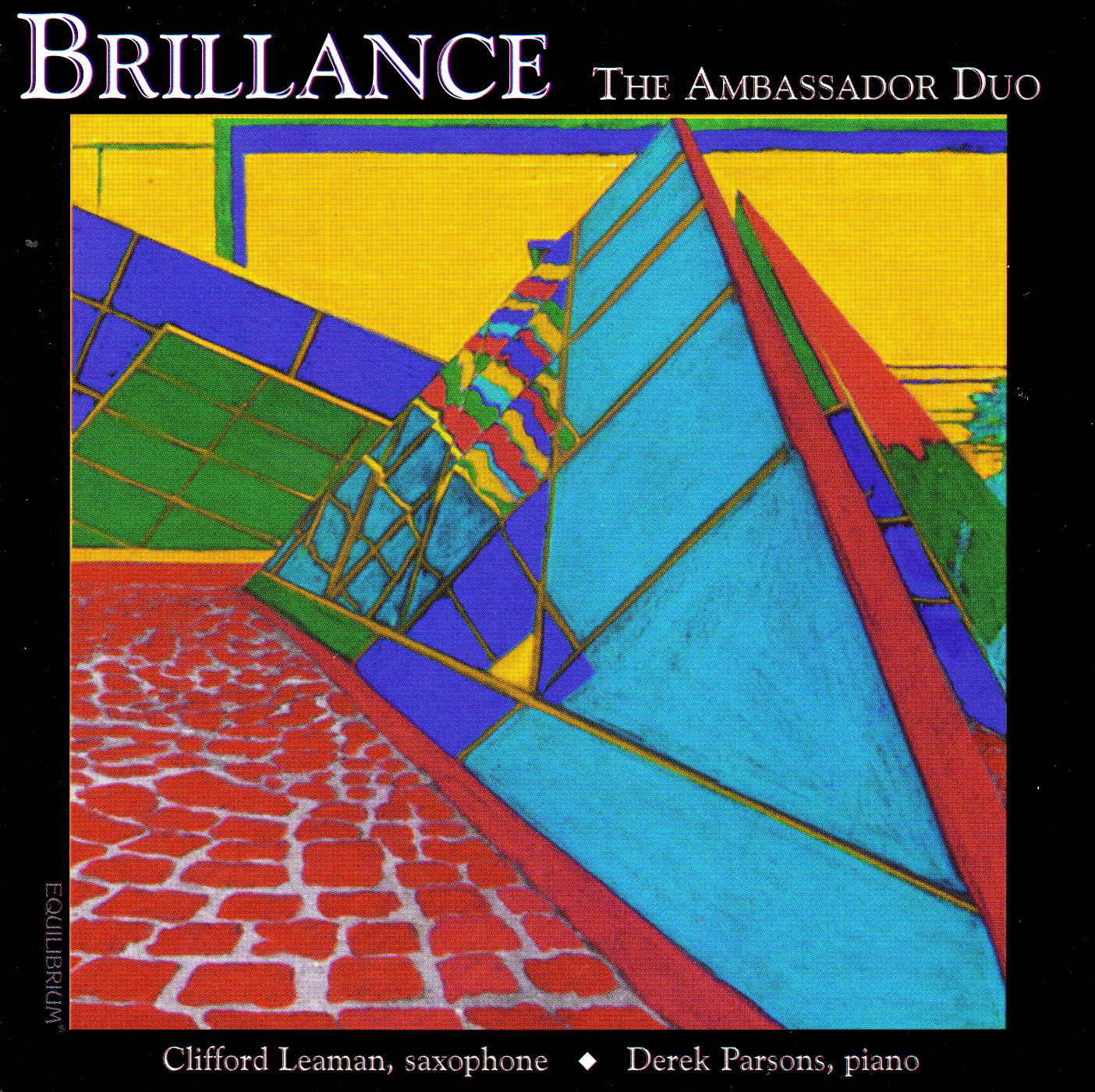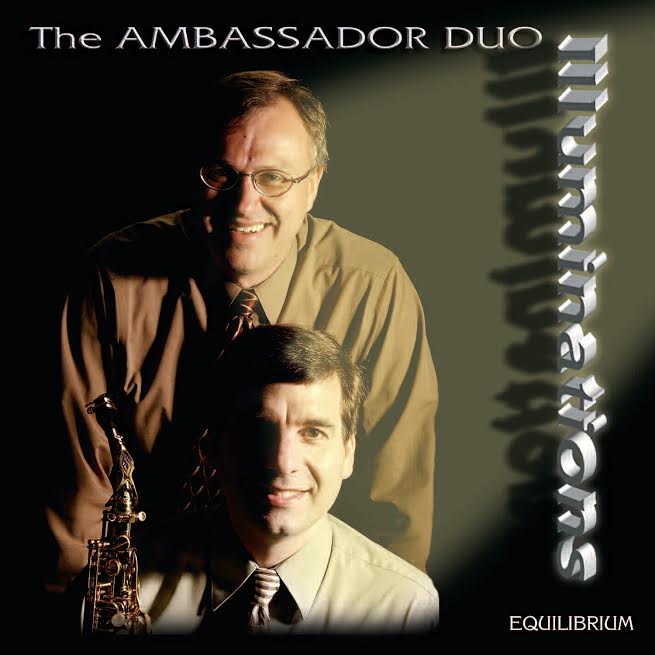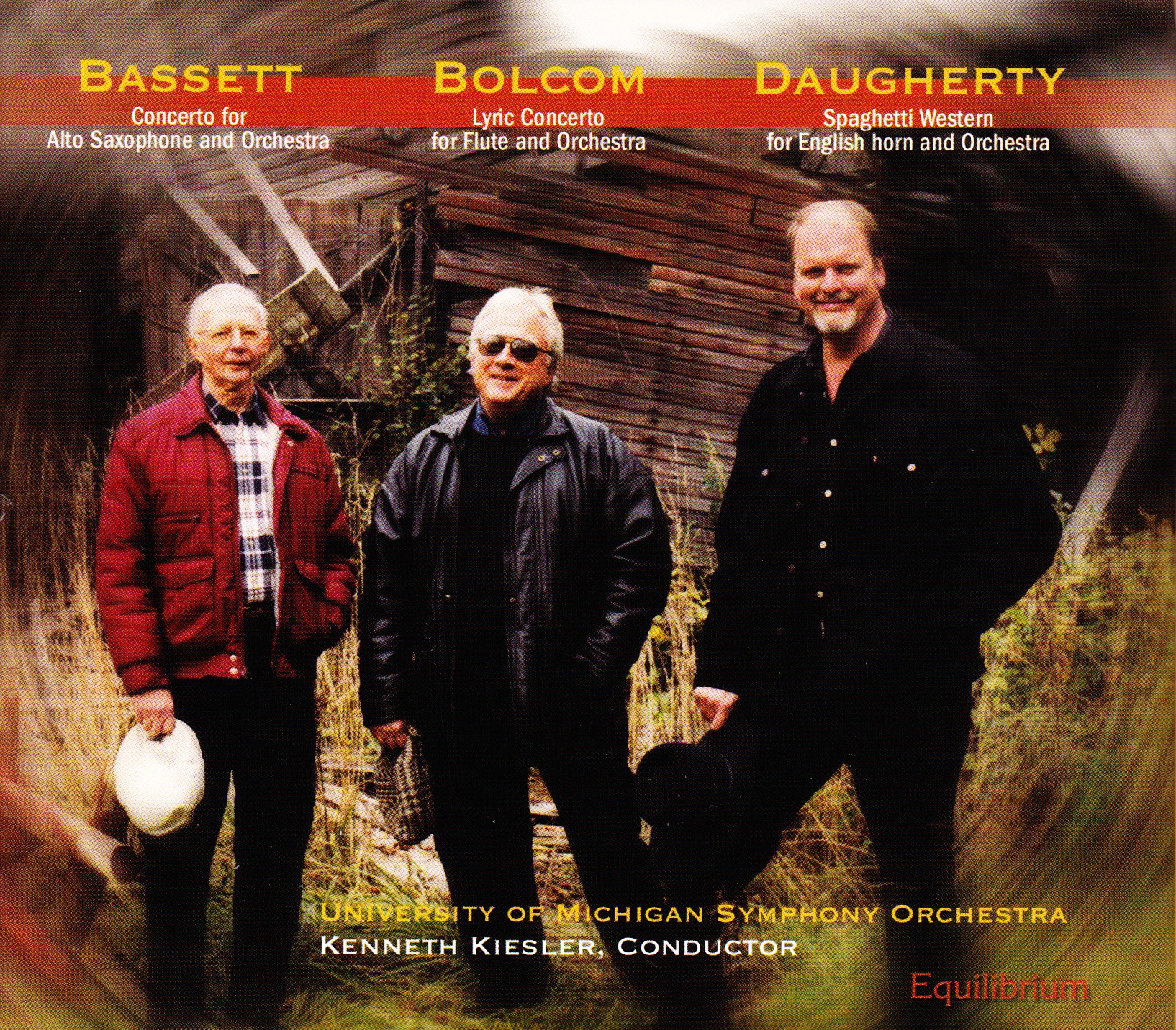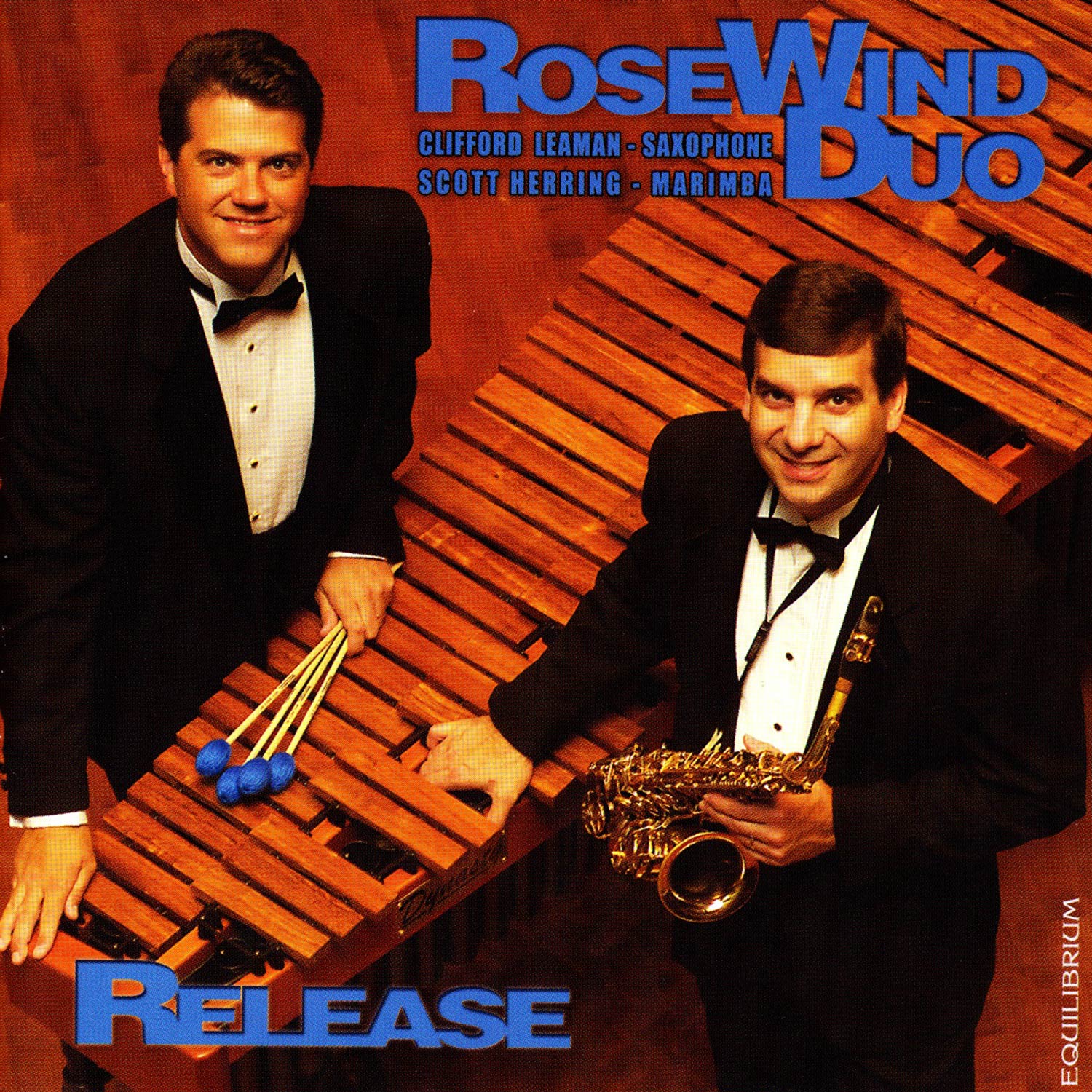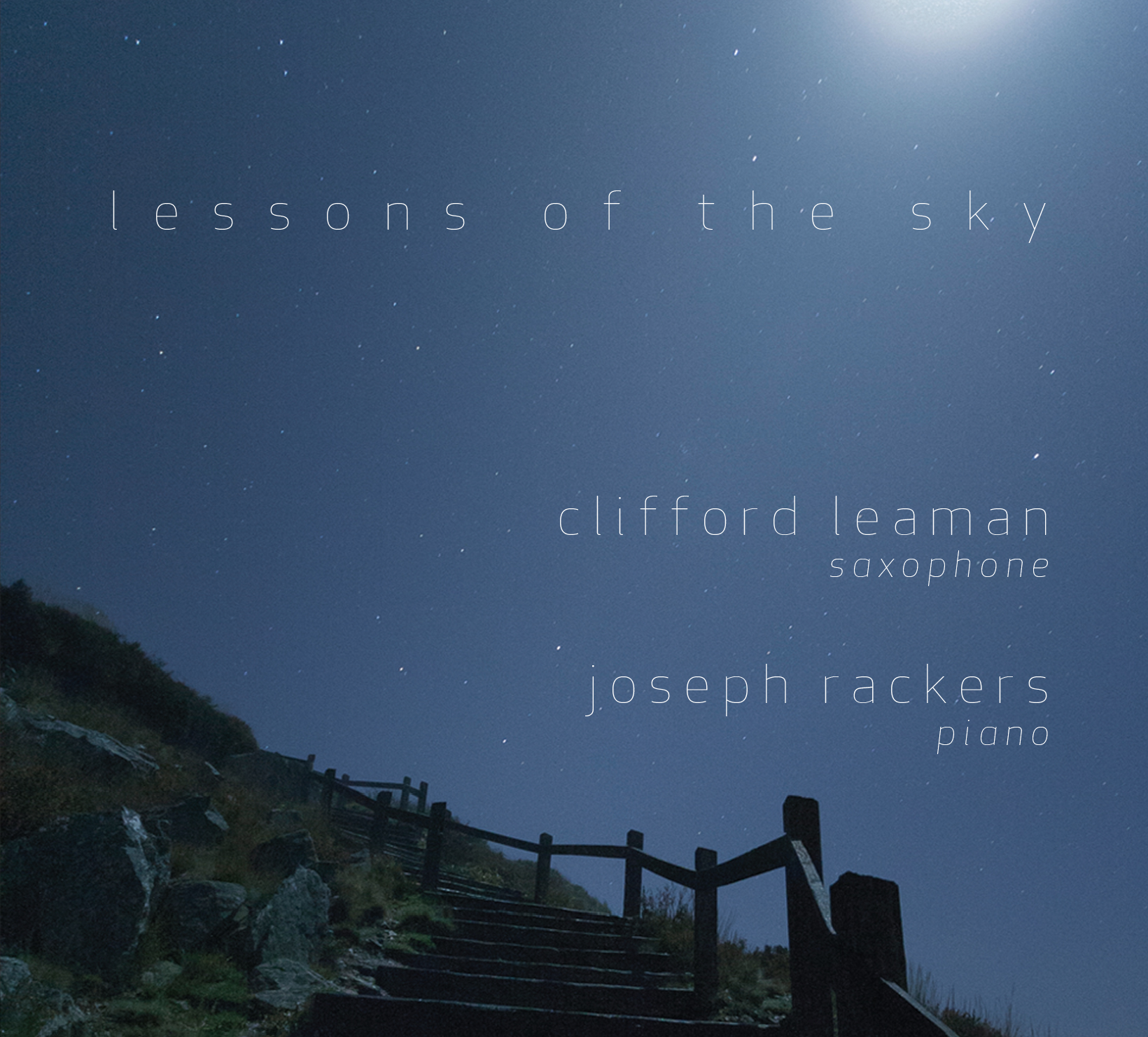| Physical CD 15.99 US | Digital Download | |
 |  Amazon Amazon |
| Matthew Orlovich: Seventh Heaven | |||
| Brillante | 01. | I. Brillante 5:11 With: Joseph Lallo - Saxophone, Peter de Jager - Piano | |
| Fugitivo | 02. | II. Fugitivo 2:37 With: Joseph Lallo - Saxophone, Peter de Jager - Piano | |
| Con ritmo | 03. | III. Con ritmo 3:00 With: Joseph Lallo - Saxophone, Peter de Jager - Piano | |
| Lullaby for the Innocent | 04. | Catherine Likhuta: Lullaby for the Innocent 12:29 With: Joseph Lallo - Saxophone, Peter de Jager - Piano | |
| John Fitz Rogers: Traces | |||
| Schools of Thought | 05. | I. Schools of Thought 4:51 With: Joseph Lallo - Saxophone | |
| Entrainment | 06. | II. Entrainment 6:20 With: Joseph Lallo - Saxophone | |
| Shard | 07. | III. Shard 3:46 With: Joseph Lallo - Saxophone | |
| if then | 08. | IV. if then 6:23 With: Joseph Lallo - Saxophone | |
| The Lily-colored Jasmine Flowers | 09. | Fang Man: The Lily-colored Jasmine Flowers 10:04 With: Joseph Lallo - Saxophone, Peter de Jager - Piano | |
| Braxton Blake: Three Dances | |||
| Rondo | 10. | I. Rondo 5:41 With: Joseph Lallo - Saxophone, Peter de Jager - Piano | |
| Sarabande | 11. | II. Sarabande 4:36 With: Joseph Lallo - Saxophone, Peter de Jager - Piano | |
| Tarantella | 12. | III. Tarantella 6:54 With: Joseph Lallo - Saxophone, Peter de Jager - Piano | |
Total Playing Time: 1:11:52 | |||
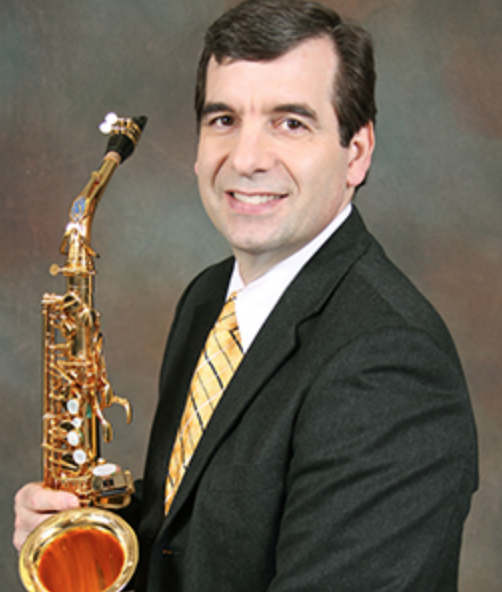
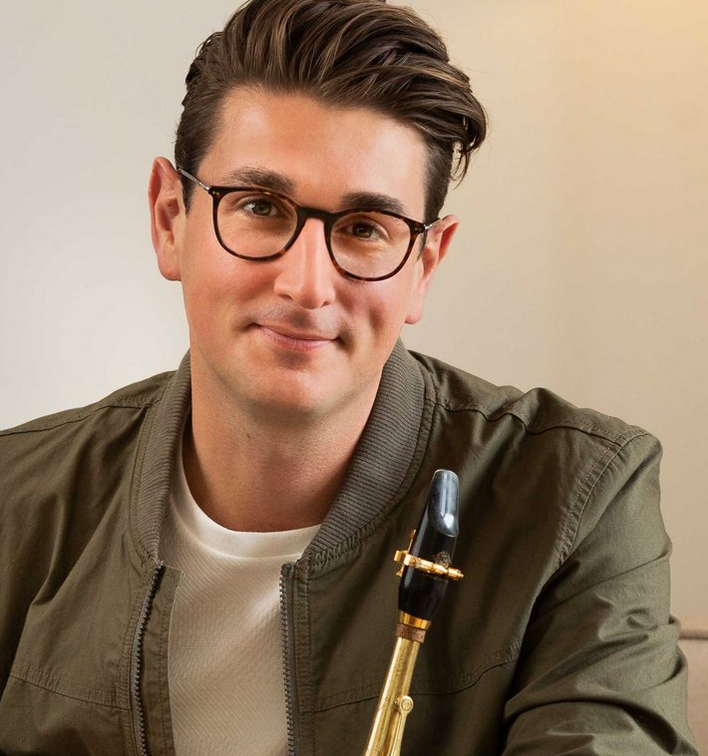
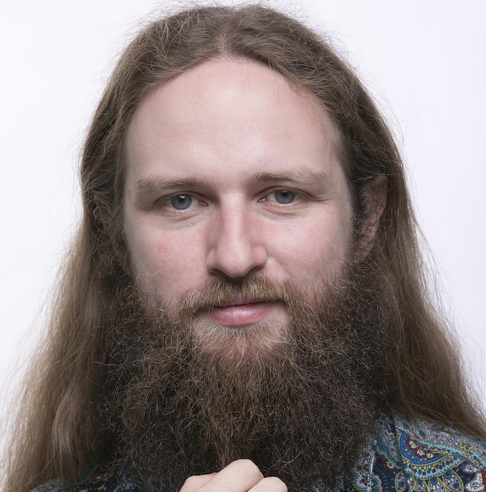
Our sincerest thanks to Matthew Orlovich, Catherine Likhuta,
John Fitz Rogers, Fang Man, Braxton Blake, and Haig Burnell.
Recorded in the Prudence Myer Studio of the lan Potter
Southbank Centre, Melbourne Conservatorium of Music,
University of Melbourne
This recording was made possible through generous grants from
the University of South Carolina Aspire program and the
Faculty of Fine Arts and Music, University of Melbourne.
Seventh Heaven
Joseph Lallo - Soprano Saxophone
Clifford Leaman - Alto Saxophone
Peter de Jager - Piano
Seventh Heaven was commissioned in 2021 by Clifford Leaman and Joseph Lallo. The title of the score is intended to suggest the abundantly joyful mood of the music and my fondness for using the interval of a Major 7th. The first movement (Brillante Œ = c. 120) sets the scene with a cavalcade of flourishing gestures, buoyant melodies, spiky rhythms and climactic modulations. Working as one, the three instruments aid and abet each other to create a highly energised, driven music. As if uninvited, a brief fragment of classically-inflected bitonal piano music makes its first contrasting appearance in the musical narrative, followed by a resumption of heightening tensions leading to the conclusion of the first movement. In the second movement (Fugitivo Œ = c. 108), the scene is one of shadows and light, zephyrs and wind chimes, with a central section marked Dolcissimo, con rubato. Beginning with a 9/8 time signature, the third movement (Con ritmo Œ. = c. 80) uses a motoric piano rhythm to underpin the lengthy strides of a new theme echoed between the two saxophones. After a series of modulations heighten the music’s tension, there ensues an abridged recapitulation of material from the first movement, followed by a decisive coda.
Dr. Matthew Orlovich (b. 1970) is a freelance composer based in Sydney, Australia. He studied composition at the University of Sydney under the supervision of Associate Professor Eric Gross and Professor Peter Sculthorpe, gaining the degrees of BMus (1st Class Honours & University Medal) and PhD. Published by Alfred Music, Morton Music, Reed Music and Waratah Music, his catalogue of scores has garnered the interest and admiration of performers and audiences worldwide and includes music for solo instrumentalists, large and small ensembles, choirs, bands and orchestras. Highlights of the catalogue include Lo, there is light! (commissioned by The Harvard University Choir, USA), Crazy Logic for saxophone and piano (performed by Gerard McChrystal and Mary Dullea at Wigmore Hall, London), Tides of Ocean (performed by the Asia Pacific Youth Choir at Milan Expo), Aviation (performed by BBC Singers, London), Carnival Capers (commissioned by Barry Cockcroft for performance with the Scottish Chamber Orchestra at the World Saxophone Congress XVI, Scotland), Butterflies Dance (performed by Latitude 34 at the inaugural Gondwana World Choral Festival, Sydney), Flying Colours (a saxophone concerto commissioned for performance by the United States Navy Band, Washington D.C.) and Escapade (a concerto for saxophone and band performed by soloist Jérôme Laran with L’orchestre d’harmonie H2O, Toulouse, France). Matthew’s most recent contributions to the repertoire include a new saxophone and tuba work for Ensemble Phantasmagoria (Portugal), a setting of poetry by Søren Kierkegaard for soprano saxophone and choir commissioned by Brisbane Chamber Choir (QLD, Australia), a concertino commissioned for premiere performance by the Sydney Conservatorium Saxophone Orchestra with soloist Dr Michael Duke, as well as new works for Nexas Quartet (Sydney, Australia), Duo Imaginaire (Germany) and HD Duo (Sydney, Australia).
Lullaby for the Innocent
Joseph Lallo - Soprano Saxophone
Clifford Leaman - Alto Saxophone
Peter de Jager - Piano
Lullaby for the Innocent (2022) was commissioned by Clifford Leaman and Joseph Lallo for their international recording project. Around the time I was supposed to start working actively on this commission, war began in Ukraine, my homeland. On the ninth day of this war, my disabled mother died in Kyiv as a direct result of Russia’s invasion. She had suffered from multiple sclerosis for decades and needed medication, which was out of reach when Russian tanks roamed the streets of her suburb, where I grew up. She ended up running out of breath. At that time, I felt I couldn’t write about anything except my mother. She was only 60 years old when she passed, and I had to witness the process of her departure via Zoom from halfway across the world, after years of being separated from her by the Covid pandemic. Lullaby for the Innocent depicts the final goodbye to the closest person in one’s life who has suffered a long and debilitating illness. It is incredibly difficult to lose a loved one, but it is a particular experience when you have cared for that person for decades and worried about them being unable to help themselves, and when your heart ached for them every day. When they leave, there is a certain sense of relief for them because they no longer have to suffer. That relief comes with a wave of guilt and a very complex bouquet of other emotions and feelings. It is impossible to describe these with words, so I chose music instead. My mom’s father was a saxophonist, and I am a pianist. Having saxophone and piano as main voices in this piece made me think of my grandfather and me playing a sorrowful yet serene lullaby to my innocent mother, who is finally at peace.
Catherine Likhuta is a Ukrainian-Australian composer, pianist and recording artist. Her music exhibits high emotional charge, programmatic nature, rhythmic complexity and Ukrainian folk elements. Catherine’s pieces have been played extensively around the world, including highly prestigious venues such as Carnegie Hall, Glyndebourne Opera House, numerous International Horn Symposiums and World Saxophone Congresses, as well as many festivals and conferences. Her works have been commissioned and performed by prominent symphony orchestras (such as Melbourne Symphony Orchestra, The Ohio State University Symphony Orchestra and Orchestra of the National Radio of Ukraine), chamber ensembles (such as Atlantic Brass Quintet, Ensemble Q, ICE, Lyrebird Brass, NU CORNO and U.S. Army Field Band Horns) and soloists (including former presidents of the North American Saxophone Alliance Griffin Campbell and the International Horn Society Andrew Pelletier). Catherine has held residencies at Tyalgum Music Festival, North Carolina NewMusic Initiative, and Universities including Missouri-Kansas City, Georgia, Ohio State, Cincinnati Conservatory of Music, Cornell, and Syracuse. She is a two-time winner of the International Horn Society Composition Contest (virtuoso division) and a recipient of several awards, including two grants from the Australia Council for the Arts. Her music can be heard on Albany, Cala, Common Tone, Equilibrium, Mark and Summit Records. Horn virtuosa Denise Tryon’s album Hope Springs Eternal featuring Catherine’s piece Vivid Dreams was awarded the 2022 American Prize in Instrumental Performance.
Traces for two alto saxophones
A central tenet of Buddhist philosophy is the notion of “dependent origination” – the idea that everything is interconnected in an infinite chain of causation, that all things exist because other things exist. This idea is echoed in the scientific law of the conservation of matter and energy, which posits that both are neither created nor destroyed but only recycled and rearranged into different forms. Drawing inspiration from these concepts, Traces explores various interconnected musical ideas across four movements. Long/short rhythms manifest in numerous gestures and phrases, and musical motives and harmonies return again and again in different guises. Although the movements sound distinct from one other, they are all based on the same rearranged musical material, and their progression even echoes earlier symphonic forms. In the last movement, if then, the interconnected musical ideas are recycled one final time in a raucous, grooving burst of energy.
Composer John Fitz Rogers\'s music has been performed and commissioned by ensembles, festivals, and venues such as Alarm Will Sound, Bang on a Can Marathon, Third Coast Percussion, American Modern Ensemble, Ear Taxi Festival, Pittsburgh New Music Ensemble, Los Angeles County Museum of Art, National Cathedral, the Albany, Louisville, Charleston, and Tulsa Symphony Orchestras, South Carolina Philharmonic, New York Youth Symphony, World Saxophone Congress, Bennington Chamber Music Conference, the MATA, Rockport, Bumbershoot, Bravo! Vail, and Bowling Green festivals, Festival of New American Music, Phillips Collection Concert Series, and the College Band Directors National Association and the Percussive Arts Society national conferences. Rogers’s recordings include Once Removed, a collection of his chamber music, and Magna Mysteria, for soprano, choir, and chamber orchestra, both on Innova Recordings. Rogers has received many fellowships and awards, including those from ASCAP, New Music USA, the American Composers Forum and the Jerome Foundation, Music at the Anthology and the Mary Flagler Cary Trust, National Flute Association, MacDowell Colony, South Carolina Arts Commission, and the Massachusetts Cultural Council, as well as the Heckscher Foundation Composition Prize. A dedicated advocate for contemporary music, Rogers founded and directed the Southern Exposure New Music Series, which received a Chamber Music America / ASCAP Award for Adventurous Programming. He holds degrees in music from Cornell University, the Yale School of Music, and Oberlin College, and is a Professor of Composition at the University of South Carolina School of Music as well as composition faculty at the Vermont College of Fine Arts.
The Lily-colored Jasmine Flowers for soprano and alto saxophone
Clifford Leaman - Soprano Saxophone
Joseph Lallo - Alto Saxophone
The Lily-colored Jasmine Flowers was commissioned by saxophonists Clifford Leaman and Joseph Lallo to whom this work is dedicated. Composed together with another work of mine “Blue Orchid Flowers on the Flowing Water” for solo harp, both pieces were inspired by Chinese folk songs about the colorful flowers. In this work, I adapted one of the most popular Chinese folksongs named “Mo Li Hua (Jasmine Flower Song)” from the Southeast Jiangnan region dated back to the 18th century. The most famous adaptation can be found in Puccini’s opera “Turandot”. This folksong depicts the purity of love by highlighting the beauty of jasmine flowers. Adapting these simple but gorgeous folksongs reflects longing for my family in the motherland as the ongoing pandemic has prevented me from going home for a long time. Lily color is often associated with femininity, compassion and love. Fang Man
Fang Man, hailed as “inventive and breathtaking” by the New York Times, is a Chinese-born American composer who has been influenced by both Eastern and Western musical and literary traditions, often borrows materials and ideas from traditional Chinese operas, instrumental music, and folk music, blending them with Western techniques and forms. Her music has been performed by the San Francisco Symphony and Los Angeles Philharmonic Orchestra New Music Group both under the baton of maestro Esa-Pekka Salonen, as well as Camerata Royal Concertgebouw Orchestra, Basel Sinfonietta, American Composers Orchestra (ACO), Tokyo Philharmonic Orchestra, National Orchestre de Lorraine, Minnesota Orchestra, Slovak Philharmonic Orchestra, among others. In 2019-20, she was featured as the composer-in-residence with the Mannheimer Philharmoniker under maestro Boian Videnoff (Germany). She was the recipient of a Guggenheim Fellowship, Koussevitzky Foundation Commission, League of American Orchestras/ the Virginia B. Toulmin Foundation Commission, an Underwood/ACO Commission, Toru Takemitsu Award (Japan), Opera America Discovery Grant, the National Endowment for the Arts Award, among other recognitions. She has been invited to new music festivals such as the Festival d\'Aix-en-Provence, Centre Acanthes (France); Darmstadt New Music Festival, and residencies such as at the Hermitage Artist Retreat in Florida, Aldeburgh Music Centre (UK), and Civitella Ranieri Music Foundation (Italy). Fang studied with Steven Stucky and Roberto Sierra at Cornell University, where she earned a Doctor of Musical Arts degree. She also studied at IRCAM-Paris and the Central Conservatory of Music in Beijing. She is currently an Associate Professor of Composition at the University of South Carolina’ School of Music.
Three Dances for soprano saxophone, alto saxophone and piano
Clifford Leaman - Soprano Saxophone
Joseph Lallo - Alto Saxophone
Peter de Jager - Piano
Three Dances was composed in 2022 for Clifford Leaman and Joseph Lallo. My long association with Clifford Leaman has been fruitful and artistically rewarding, and this composition is the third work of mine he has commissioned. I am pleased to begin my association with Joseph Lallo through this project. The rhythmic drive and spiky syncopation of funk music from the 1960s and early 70s has long influenced my rhythmic language and, though veiled, is present in the first movement, Rondo. Additional elements that comprise the movement’s fabric are the extensive use of hocket and canon as well as piano textures that are influenced by jazz or and funk drumming. The work’s harmonic language is often woven of disparate major and minor triads, either stacked or arpeggiated. The more melodic material circles but never quite lands on a firm tonal center. Elegiac in character, the Sarabande is in stark contrast to the work’s outer movements. It is almost static in character and is influenced by the gray and austere winter beaches that have moved me since childhood and have influenced other works of mine. The material for the two saxophones is almost motionless, the individual parts move mostly by step. The languid piano voice slowly closes in a quiet solo that serves as the movement’s envoi. The concluding Tarantella is an energetic moto perpetuo. It is a driven, virtuosic movement that draws upon the harmonic language of the Rondo. Here too, the techniques of hocket and canon are used throughout. After completing the Tarantella, I realized that it was influenced by the finale to the Brahms d-minor violin sonata, a work I was studying at the time.
Braxton Blake was raised in Galveston, Texas, where he first studied composition and theory with Francis J. Pyle, and thereafter at the University of Houston with Michael Horvit and Thomas Benjamin, with additional concentrations in piano and conducting. He received the MM and PhD degrees from the Eastman School of Music, where he studied with Samuel Adler, Warren Benson, and Joseph Schwantner, and served as music director of the Musica Nova Ensemble. Blake has participated in various music festivals, including the Aspen Music Festival, the Bayreuth Festival, and the Dartington Festival. While living in Stuttgart, he studied composition with Milko Kelemen at the Staatliche Musikhochschule. He served as music director and toured extensively with the Erick Hawkins Dance Company, New York, as well as guest conducting appearances with Ensemble Modern, Frankfurt, Musik Fabrik, the Stuttgart Philharmonic, the San Francisco Contemporary Music Players, the South German Radio Choir, Ensemble 20, the Stuttgart Ballet, the Studio Ensemble Stuttgart, and Musica Nova Stuttgart. He has recorded extensively for the South German Radio and the labels Muza and Col Legno. Blake’s commissions include those from the Sonderjyllands Symfoniorkester (Denmark), the Galveston Symphony, the Stuttgart Philharmonic, the West German Radio (Cologne), the Stuttgart Ballet, and the University of Michigan. His works have been recorded for CD and broadcast by Southwest German Radio and can be heard on the labels Ars-Musici, Troy, and Albany. Mr. Blake is a recipient of the Wladimir and Rhoda Lakond Award from the American Academy of Arts and Letters.

